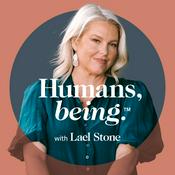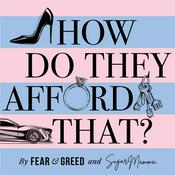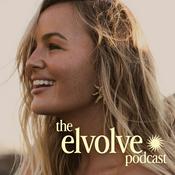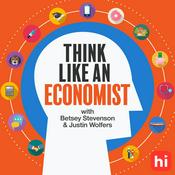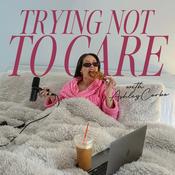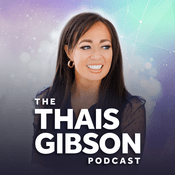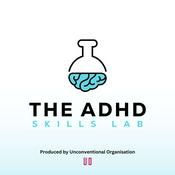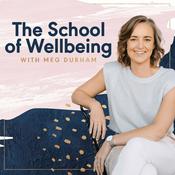65 episodes
- Have you ever walked away from a conversation about men and women feeling more stuck than when you started? You made your point. They made theirs. And somehow you both ended up further apart than before.
It’s exhausting — the same arguments, the same defensiveness, the same feeling that for someone to win the other side has to lose. After a while, you start wondering: is there another way to do this? Or are we just destined to keep circling?
What if the way out isn’t about who’s right or wrong — but about how we approach these conversations?
Three Ideas That Keep Surfacing
As we close out Season 3 of the podcast on gender compassion, we keep coming back to three ideas our guests shared:
* Sarah Wilson challenged us to stop hating the players and start changing the game — to move beyond blame and build the skills of collaboration, cooperation, and communication our future depends on.
* Dr. Carol Gilligan shared that after decades of groundbreaking gender research, she now wishes she’d spent more time studying how we thrive as human beings together.
* And Dr. Niobe Way encouraged us not to settle for “thin” gender stories — the rigid societal expectations of “good girls” and “strong boys” — but to reach for “thick” stories that create space for the complexity of the human experience.
These three ideas point to the same place: the way out of the gender battles that are keeping us stuck isn’t about deciding whether gender matters or doesn’t. It’s about developing the compassion to meet people where they are.
This is a public episode. If you would like to discuss this with other subscribers or get access to bonus episodes, visit michellemcquaid.substack.com - Have you noticed how quickly gender conversations turn into battles we can’t seem to win? She said this, he did that, who has it worse, who should apologize first. But once we’re locked in—your suffering versus mine, who should apologize first—we’re trapped in a zero-sum game. So how do we free our energy from the gender wars, not by hating the players but by changing the game?
[00:00] Chelle introduces Sarah Wilson — multi–New York Times bestselling author, social philosopher, and host of Wild with Sarah Wilson.
[01:51] Chelle and Sarah discuss why the growing gender divide is emerging so sharply at this point in history.
[06:37] Chelle and Sarah reflect on the fear underlying gender tensions and why energy is being directed toward gender conflict rather than broader global challenges.
[09:40] Chelle and Sarah discuss how neoliberalism removed community guardrails and how this has impacted men’s emotional and social development.
[11:27] Chelle and Sarah explore the idea of changing the “game” rather than blaming the “players,” and why collaboration is essential.
[12:06] Chelle and Sarah unpack the concept of the Moloch scenario and how zero-sum traps show up in climate action, AI development, nuclear arms, and everyday social behaviour.
[17:41] Chelle and Sarah discuss compassion as a messy, nonlinear process and how accountability unfolds within complexity.
[20:23] Chelle and Sarah discuss how everyday conversations — not just public forums — can model gender compassion and cultural change.
[24:48] Chelle and Sarah talk about Sarah’s upcoming 2026 book release and how community discussion has shaped the writing.
[26.00] Chelle & Evie post-show discussion.
This is a public episode. If you would like to discuss this with other subscribers or get access to bonus episodes, visit michellemcquaid.substack.com - Have you noticed how quickly conversations about gender turn into competitions about who has it worse? One side insists men are the real victims—look at the loneliness epidemic, the education gaps, the suicide rates. The other side counters that women are the real victims—look at the violence statistics, the unpaid labor, the centuries of having our voices silenced. Both sides race to claim the prize of victimhood. But what might be possible if we quit playing the blame game?
[00:02] Chelle introduces writer of the Substack publication - Matriachal Blessing - Celeste Davis.
[02:12] Celeste and Chelle discuss how online (and offline) gender debates often devolve into opposing victim narratives and why this competitive framing is ineffective.
[05:52] Celeste explains the Drama Triangle dynamics and how the Victim–Persecutor–Rescuer cycle keeps us stuck in blame rather than solutions.
[08:42] Chelle reflects on how hard it is to escape reactive roles, noting how our brains cling to them for a false sense of safety.
[09:41] Celeste introduces the conflict escalation model, outlining the three stages — rational, emotional, and fight — and how rising tension shifts goals from compromise, to winning, to wanting the other side to lose.
[13:59] Celeste and Chelle discuss how patriarchy (and other power systems) benefit from keeping men and women divided.
[19:12] Celeste and Chelle explore “two truths at once,” using the Richard Reeves example to illustrate how focusing only on male pain OR only on male harm creates incomplete stories.
[23:28] Celeste shares her personal story, from a Mormon upbringing and forgiveness-only tools, through awakening rage, to eventually developing a more balanced view: men are harmed and men harm.
[26:21] Celeste shares how she speaks and supports her sons and daughters. [30:43] Chelle reflects on teaching her own sons to see and “bend” systems, not just comply with them.
[33:17] Chelle and Celeste highlight the difference between fitting in and belonging, and how long-term benefits of authenticity outweigh short-term approval losses.
[35:56] Post-show with Chelle & Evie
This is a public episode. If you would like to discuss this with other subscribers or get access to bonus episodes, visit michellemcquaid.substack.com - Ever noticed how much pressure there is for ‘good girls’ to perform compassion and for ‘strong boys’ to avoid it?
[00:00] Evie & Chelle share the gender expectations they're shaking off.
[02:00] Chelle shares Ah Ha #1: how early socialization creates deeply different relationships with compassion—women often perform it to earn love, while men armor up against it for survival.
[06:20] Evie introduces Tool #1: Reaching for Compassion with four steps: listen to learn, understand to know, connect to capabilities, and then act to solve.
[11:15] Evie shares Aha #2: Accountability isn't about blaming and punishing someone, but partnering together.
[12:42] Chelle introduces Tool #2: Own It with three questions to do our accountability work first: What's mine to own? Have I made my expectations clear? If boundaries were crossed, have I voiced it?
[17:57] Chelle shares Aha #3: We can't just do our own work—healthy accountability requires partnership.
[20:36] Evie shares Tool #3: Share the Load with four steps: get clear on expectations (for me, for you, for us), check motivation levels, decide how to track progress, and adjust as needed when things go off track.
[23:33] Chelle shares a vulnerable story about her son Charlie holding her accountable.
[30:54] Chelle summarizes the three ahas and three tools covered in the episode.
[34:22] Post-show discussion with Evie and Chelle.
This is a public episode. If you would like to discuss this with other subscribers or get access to bonus episodes, visit michellemcquaid.substack.com - Accountability isn’t about blame. It’s not about compliance. It’s actually about clarity, integrity, and honoring what matters in our relationships with each other. This is how compassion and accountability work together.
[01:28] Chelle welcomes Paige and reflects on their past cliff-top conversation that inspired this episode.
[02:27] Paige and Chelle explore how performance, protection, and disconnection are human dynamics shaped by patriarchal systems, not just gender ones. [05:53] Paige and Chelle explain how compassion and accountability are not opposites but coexisting forces.
[10:09] Paige invites listeners to start with what’s mine to own?—recognizing human bias, clarifying expectations, and voicing boundaries rather than assuming others can read our minds.
[15:20] Paige and Chelle discuss how early conditioning teaches us to betray our own needs and how accountability begins by reclaiming our truth. Paige shares her “6Ws Framework”to help clarify expectations and communicate cleanly.
[24:07] Paige reframes accountability as partnering rather than policing—a dynamic that activates choice, agency, and mutual understanding.
[36:21] Paige and Chelle distinguish between local safety (protecting ourselves in harmful relationships) and global openness (not letting those experiences define our worldview).
[40:36] Paige and Chelle reflect on how cultural norms calcify both women and men—women shrink, men harden.
[42:34] Paige shares her closing remark: accountability is an act of love.
[44:18] Chelle and Evie post-show discussion.
This is a public episode. If you would like to discuss this with other subscribers or get access to bonus episodes, visit michellemcquaid.substack.com
More Education podcasts
Trending Education podcasts
About The Good Girl Game Changers Podcast
Helping women break free of their ‘good girl’ beliefs with practical evidence-based tools to embody their unique selves. michellemcquaid.substack.com
Podcast websiteListen to The Good Girl Game Changers Podcast, anything goes with emma chamberlain and many other podcasts from around the world with the radio.net app

Get the free radio.net app
- Stations and podcasts to bookmark
- Stream via Wi-Fi or Bluetooth
- Supports Carplay & Android Auto
- Many other app features
Get the free radio.net app
- Stations and podcasts to bookmark
- Stream via Wi-Fi or Bluetooth
- Supports Carplay & Android Auto
- Many other app features


The Good Girl Game Changers Podcast
Scan code,
download the app,
start listening.
download the app,
start listening.


